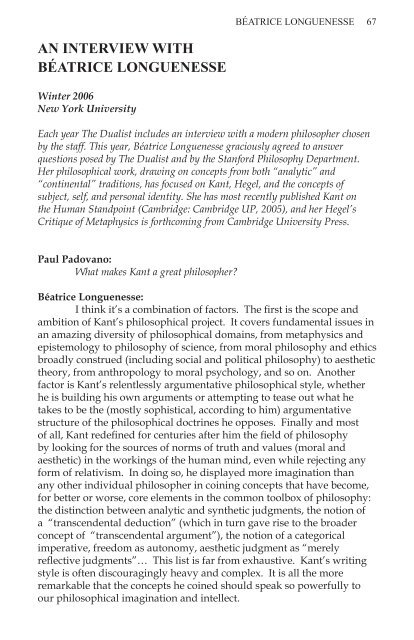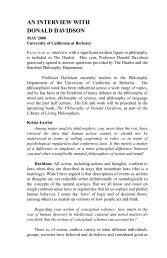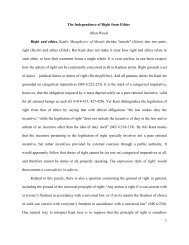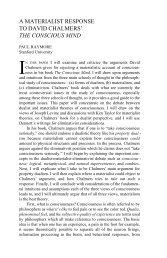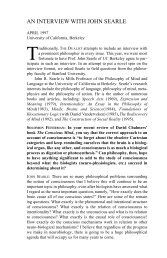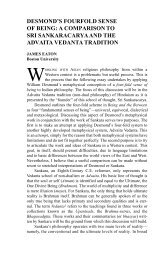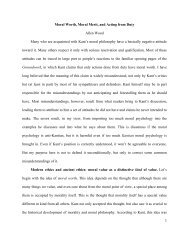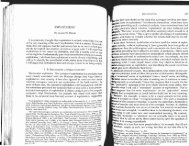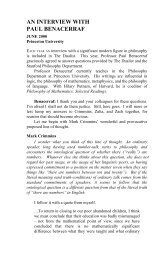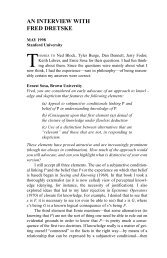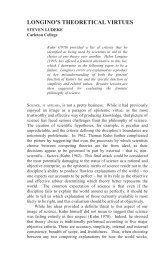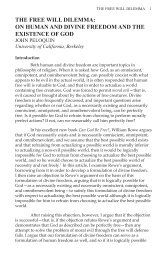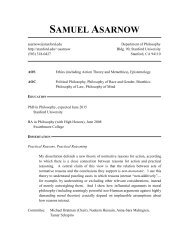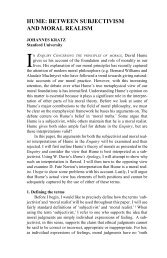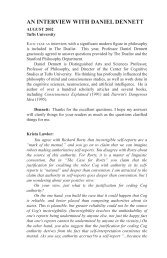An Interview with Beatrice Longuenesse - Stanford University ...
An Interview with Beatrice Longuenesse - Stanford University ...
An Interview with Beatrice Longuenesse - Stanford University ...
- No tags were found...
Create successful ePaper yourself
Turn your PDF publications into a flip-book with our unique Google optimized e-Paper software.
BÉATRICE LONGUENESSE 67AN INTERVIEW WITHBÉATRICE LONGUENESSEWinter 2006New York <strong>University</strong>Each year The Dualist includes an interview <strong>with</strong> a modern philosopher chosenby the staff. This year, Béatrice <strong>Longuenesse</strong> graciously agreed to answerquestions posed by The Dualist and by the <strong>Stanford</strong> Philosophy Department.Her philosophical work, drawing on concepts from both “analytic” and“continental” traditions, has focused on Kant, Hegel, and the concepts ofsubject, self, and personal identity. She has most recently published Kant onthe Human Standpoint (Cambridge: Cambridge UP, 2005), and her Hegel’sCritique of Metaphysics is forthcoming from Cambridge <strong>University</strong> Press.Paul Padovano:What makes Kant a great philosopher?Béatrice <strong>Longuenesse</strong>:I think it’s a combination of factors. The first is the scope andambition of Kant’s philosophical project. It covers fundamental issues inan amazing diversity of philosophical domains, from metaphysics andepistemology to philosophy of science, from moral philosophy and ethicsbroadly construed (including social and political philosophy) to aesthetictheory, from anthropology to moral psychology, and so on. <strong>An</strong>otherfactor is Kant’s relentlessly argumentative philosophical style, whetherhe is building his own arguments or attempting to tease out what hetakes to be the (mostly sophistical, according to him) argumentativestructure of the philosophical doctrines he opposes. Finally and mostof all, Kant redefined for centuries after him the field of philosophyby looking for the sources of norms of truth and values (moral andaesthetic) in the workings of the human mind, even while rejecting anyform of relativism. In doing so, he displayed more imagination thanany other individual philosopher in coining concepts that have become,for better or worse, core elements in the common toolbox of philosophy:the distinction between analytic and synthetic judgments, the notion ofa “transcendental deduction” (which in turn gave rise to the broaderconcept of “transcendental argument”), the notion of a categoricalimperative, freedom as autonomy, aesthetic judgment as “merelyreflective judgments”… This list is far from exhaustive. Kant’s writingstyle is often discouragingly heavy and complex. It is all the moreremarkable that the concepts he coined should speak so powerfully toour philosophical imagination and intellect.
68 AN INTERVIEWJohanna Wolff :What do you take to be the most relevant aspect of Kant’s theoreticalphilosophy for contemporary debates?<strong>Longuenesse</strong>:Many aspects of Kant’s theoretical philosophy are relevant tocontemporary debates. One prominent example is Kant’s discussionof the nature of space and time and its relevance to Newtonian science,which has not been sufficiently explored in relation to contemporarydiscussions of substantivalism versus relationalism about space andtime. I have learnt a great deal about this issue from the work of myformer student <strong>An</strong>ja Jauernig, now an assistant professor at Notre-Dame. As far as my own current interests are concerned, the mostrelevant aspect of Kant’s theoretical philosophy for contemporarydebates is the philosophy of mind he develops as the backbone of histranscendental philosophy (namely his investigation into the possibilityof objective knowledge). By Kant’s philosophy of mind I mean, forinstance, Kant’s analysis of the relation between self-consciousness andconsciousness of objects, his analysis of intentionality (his account ofthe directedness or “aboutness” of conscious states), the role he assignsto imagination and to concepts in sensory perception, his analysis ofconcept formation and of the relation between conceptualizing andjudging, and of course his account of the ways in which we come up<strong>with</strong> the logical and epistemic norms for our cognitive activities. Onemay wonder whether these questions are not now more properlythe domain of empirical psychology and cognitive science than ofphilosophy. But I think relating questions about the workings of ourminds (which certainly have and should have empirical answers) toquestions about the scope and validity of our claims to knowledge of theworld outside us, is still the proper domain of philosophy. Kant’s styleof investigation, in this regard, is more relevant than ever.Katherine Dunlop:Your work has shown that Kant tends to use important terms, e.g.reflection, matter and form, and determination, in very different ways indifferent contexts. In your own work, what principles do you use to determinehow one of these terms is used in a particular context?<strong>Longuenesse</strong>:I have no fail-proof recipe to offer that would help decide whichuse of a concept is in place in any given instance. There is, howeverone general principle one should always keep in mind, the principleof charity: if an argument seems to make no sense at all under one
BÉATRICE LONGUENESSE 69interpretation of a given term, try to see if there is not another plausibleinterpretation that would allow the argument to make sense.You cite two examples (“reflection,” “matter/form”) thatraise different problems. “Reflection” is a term Kant inherits fromthe empiricist tradition (Locke and Hume on the distinction betweensensation and reflection), where it means the perception by the mind ofits own operations. But in the context of his Logic, and then again in thethird Critique, Kant uses the term in a different sense (which he explicitlydefines): reflecting is looking for a universal rule, or a universal concept,under which a particular instance might fall. Finally, in the first Critiquehe coins the term “transcendental reflection” to describe the investigationinto the nature and origin of a representation (whether intuition orconcept, sensible or intellectual). Which of these senses is relevant will ineach case have to be determined by the context.The case of “matter/form” is different. There I think there isjust one meaning for the pair, which Kant explicitly gives (and whichis classic since Aristotle): matter means “determinable,” form means“determination.” However, these are relational terms: the determinableis always the determinable for a specific determination, and conversely thedetermination determines a specific determinable. The difficulty here is toestablish which determinable we are talking about, which determinationwe are talking about, and this again will depend on the context and onthe particular argument under consideration.Allen Wood:Your work on Kant’s table of categories is distinguished by the wayin which it treats sympathetically the Wolffian tradition in logic and Kant’sinterpretation of it. For a long time, philosophers reading Kant, and evenscholars of Kant’s theoretical philosophy, have refused to take this path becausethey regard that entire way of thinking about logic as hopelessly outdated andjust plain wrong. What would you say in response to someone who objected toKant, and to your sympathetic interpretation of his theoretical philosophy, onthose grounds?<strong>Longuenesse</strong>:This is a very important question. All too often, trying tofree a philosopher from the past of what seems to us most obviouslyoutdated in his way of setting up his problems ends up loading him<strong>with</strong> even worse presuppositions or arguments. The reading of Kant’smetaphysical deduction of the categories that prevailed for a goodpart of the twentieth century is a case in point. In trying to understandKant’s table of judgments in the terms of contemporary logic, one notonly found it hopelessly flawed, but also found Kant’s whole argument
70 AN INTERVIEWconcerning the relation between functions of judgment and synthesesof intuitions utterly incomprehensible. In contrast, by taking up Kant’stable in its own terms, I was able (I hope) to make sense of it and alsoto bring decisively new light on core arguments of the first Critique as awhole: not only the transcendental deduction of the categories, but alsoKant’s arguments for his Principles of the possibility of experience, aswell as core arguments in the Transcendental Dialectic.Now this would be a poor gain if it meant that the Critique itself is justas outdated as the outdated logic on which it depends. But I don’t thinkthat’s true. Unfortunately I have to be too quick here. I’ll just mention twopoints. 1) In accepting to take Kant’s Logic as Kant understood it, I was ledto consider seriously the relation between logical forms (as he understoodthem) and the ordering of the contents of our perceptions. In doing thisI came very close to contemporary discussions of the conceptual or nonconceptualcontents of our perceptual states, <strong>with</strong>out sacrificing anythingof Kant’s original inspiration. Being historically accurate, far from leadingme away from what is most relevant and interesting from a contemporarystandpoint, on the contrary drove me closest to contemporary issues. 2)This, I think, raises a very important question: what if Kant was right tothink that traditional Aristotelian logical forms were basically tools forordering the contents of our perceptions? What would that tell us aboutthe relation between contemporary, post-Fregean and post-Russellianmathematical logic, and Kant’s very elementary logic as a mere expositionof rules for combining concepts as “general and reflected representations”?I try to address these questions in my more recent writings on Kant, and Ihave high hopes that younger Kant scholars such as Houston Smit, Lanier<strong>An</strong>derson, Lisa Shabel, Daniel Sutherland, Timothy Rosenkoetter, andothers, will be able to go much further than I have on these issues.Alexei <strong>An</strong>gelides:In your book, Kant and the Capacity to Judge, you give pride ofplace to Kant’s writings on logic and, in particular, you give pride of place tohis understanding of the notion of judgment and emphasize its role in the firstCritique. The result is an interpretation that stresses the close relationshipbetween the logical form of judgment and empirical cognition. How are we tounderstand the relationship between logical form and empirical cognition in thissense in light of Kant’s seemingly strict distinction between analytic/synthetic,non-ampliative and ampliative cognition in the opening to the Critique?<strong>Longuenesse</strong>:This is one of the issues about which it is important to keep inmind the difference between Kant’s logic and Fregean logic. Kant doesnot equate the domain of logic and that of analytic judgments. Kant’s
BÉATRICE LONGUENESSE 71logical forms of judgment are forms both of analytic and of syntheticjudgments. In other words, they are common to judgments in whichthe predicate-concept merely explicates what is already contained in thesubject-concept (analytic, “non-ampliative judgments”), and judgmentsin which the predicate-concept is related to a subject-concept in which itwas not already contained (synthetic, “ampliative judgments”). When Istress the importance of logic for Kant’s argument in the Critique, what Imean to show is that for Kant, in understanding the nature of the logicalforms of judgment we will also understand the nature of the synthesesof sensible intuitions necessary so that intuitions can be subsumed underconcepts combined according to those forms. This of course does notmake empirical judgments analytic, or non-ampliative. On the contrary,it shows how logical forms of judgment (in Kant’s sense), or rather thefunctions of the understanding whose discursive forms are the logicalforms of judgment, are at work in guiding the syntheses necessary to theformation of (empirically) ampliative judgments.Ludmila Guenova:In Kant and the Capacity to Judge, you write of Kant’s internalizedrelation between empirical objects and their representations (17-21). On youraccount, when Kant internalizes the relation between a representation andits object such that he conceives it as a relation wholly <strong>with</strong>in the sphere ofrepresentations, he thereby makes the first step toward solving the problem ofhow we could legitimately apply our a priori concepts to given objects. Laterin the book, however, you mention another type of relation, i.e., the relationbetween things in themselves and empirical objects; or, more precisely, acorrespondence of what is “outside me (i.e. distinct from myself and myrepresentations) to what appears to me as a body in the form of space” (239).Although you do not directly address the debates over Kant’s distinctionbetween phenomena and noumena, your discussion of these two types of relationseems to bear on the issue: First, it seems that, if Kant can internalize therelation between a representation and its empirical object, he can do so only atthe cost of conceiving of empirical objects as mere representations. Second, yousuggest that there are independently existing things, i.e. noumena, that in somesense correspond to these empirical objects, but which remain unknowable to us.But, if so, then such a reading of Kant comes close to attributing to him a certainmetaphysical picture according to which there is a sharp division between therealm of our representations and the realm of things as they exist in themselves,and, according to which, moreover, our objective experience remains enclosed<strong>with</strong>in the former, representational realm. Would this be fair characterization ofyour view?
72 AN INTERVIEW<strong>Longuenesse</strong>:Yes, I think it is a fair characterization of what I say in the book,although I am not sure I would call this a “metaphysical picture.” Iwould perhaps call it an epistemological account, or better, in Kant’sterms, a transcendental account: an elucidation of the conditions thatmake possible any knowledge at all. On this account, the distinctionbetween things as they are in themselves and things as objects ofexperience (and as such, representations in us) is a distinction concerningthe way we know things and what we know about them, not a distinctionbetween two distinct worlds, or two distinct realms of entities. There isone realm of entities, “things.” These things are considered either “asthey are in themselves” (and as such, unknowable), or “as they appearto us” (and as such, mere representations in us).This being said, I must add that I am not satisfied <strong>with</strong> the wayI presented the issue in the book. I think I presented my own notion of“internalization” too much as if it meant internalization <strong>with</strong>in the mind(although I do not use the expression: I am at least cautious enoughto talk of internalization <strong>with</strong>in the realm of representation). Strictlyspeaking, for Kant the very notion of a mind as a particular kind ofentity distinct from what is external to it, is itself an empirical notiondepending on those very forms (forms of intuition, categories) that makepossible the representation of any object at all. I think it would havebeen more helpful to define the notion of “internalization <strong>with</strong>in therealm of representation” strictly in terms of “internalization to the formsof representation,” i.e. the modes of ordering of our representations:forms of intuition (space and time), forms of conceptualization (forms ofjudgment, categories). This would, after all, be in keeping <strong>with</strong> Kant’sdescription of his own idealism as a formal idealism. If I had stuck tothis formulation, then I would have remained closer to the first optionI offer as a possible interpretation of “internalization,” in the note yourefer to in your question (fn.9 on p.20 of Kant and the Capacity to Judge).“Internalization <strong>with</strong>in representation” means internalization <strong>with</strong>inthose forms (forms of intuition and logical functions of judgment),whatever the ultimate ground of the latter in the nature of things “asthey are in themselves.” This clearly takes me closer to Allison’s “oneworld”view. I still think, however, that Kant’s own formulations arewoefully ambiguous on this point.Guenova:In Chapter 7 of Kant and the Capacity to Judge, you draw adistinction between judgments of perception and judgments of experience. IfI am understanding that distinction correctly, judgments of perception occurwhen empirical representations are not yet subsumed under the categories,
BÉATRICE LONGUENESSE 73although they are grounded on the transcendental unity of apperceptionand on the logical functions of judgment. Given this status, judgments ofperception are merely subjectively valid. By contrast, judgments of experienceoccur when an empirical representation is brought under a determinatecategory; such judgments are objective in the sense that they are valid notonly for me but for every possible epistemic agent. Such a distinction betweenjudgments of perception and experience helps not only to resolve some apparentinconsistencies between the Prolegomena and the first Critique, it also seemsto resolve a problem internal to the first Critique: namely, how could Kant allowfor merely subjective representations if all representations must be grounded onthe transcendental unity of apperception. I find this argument not only highlyoriginal, but also quite compelling. Yet I wonder whether you might elucidatethe following points: (a) In what sense is there a “conatus” from judgmentsof perception to judgments of experience? (b) There seems to be a prima facieobjection here, that, in the B-edition of the Transcendental Deduction, Kantdoes not seem to distinguish between empirical representations subsumed underthe categories and those that are brought only under the unity of apperception.In fact, Kant’s strategy for deducing the categories relies precisely on thelack of such a distinction. Thus, in section 20, Kant appears to argue that if amanifold of sensible intuition is brought under the unity of apperception, thenit must be brought under not only a logical functions of judgment, but alsothereby determined under a corresponding category. <strong>An</strong>d it is by equatingall of these together—i.e., the unity of apperception, the logical functions ofjudgments, and the categories—that Kant can then drive the point home that thecategories must be objectively valid for any manifold of a sensible intuition. Butthis prima facie reading of Kant seems to run against your own. Could youbriefly sketch an answer to such an objection?<strong>Longuenesse</strong>:a) I may be wrong, but I do not remember saying there is aconatus from judgments of perception to judgments of experience. WhatI do say is that before they are used as universal concepts under whichobjects are subsumed, categories are at work as forms of synthesis ofwhat is given in sensibility, and as such forms of the conatus, or theeffort, to form judgments (KCJ, p.196). This is what you describe atthe beginning of your question: as I understand him, Kant claims thatknowledge of objects depends on an ongoing effort to synthesize what isgiven in sensibility so that it can be reflected under (empirical) concepts Kant writes, “That action of the understanding, however through which the manifold ofgiven representations (whether they be intuitions or concepts) is brought under an apperceptionin general, is the logical function of judgments/ Therefore all manifold, insofar asit is given in one empirical intuition, is determined in regard to one of the logical functionsfor judgment, by means of which, namely, it is brought to a consciousness in general. Butnow the categories are nothing other than these very functions for judging, insofar as themanifold of a given intuition is determined <strong>with</strong> regard to them. Thus the manifold in agiven intuition also necessarily stands under categories.” (B143)
74 AN INTERVIEWrelated according to logical forms of judgments. Now, is there a similarconatus from judgments of perception to judgments of experience? Isuppose one could say that there is a cognitive drive, as it were, to relateany of our empirical judgments to other empirical judgments, accordingto universal laws. In other words, the very same effort at work insynthesizing and reflecting objects of intuition under concepts relatedin empirical judgments also strives to unify those objects of intuition inone space and one time, and to unify those empirical judgments underuniversal laws. It is when such unity is found (at least to some degree)that judgments of experience, subsuming objects under categories,are acquired. For instance, one progresses from the mere judgmentof perception: “if the sun shines on the stone, then the stone becomeswarm,” to the judgment of experience: “the sun is by its light the cause ofthe heating of the stone.”b) Is the distinction I propose between two uses of thecategories (one as mere guides for synthesis giving rise to judgmentsthat are initially mere judgments of perception, the other as universalconcepts under which empirical objects are subsumed, in judgments ofexperience) contradicted by §20 of the Transcendental Deduction? I don’tthink so. I do agree that the argument of §20 rests on the fact that sucha distinction is not made. There it is enough, in order to justify sayingthat appearances necessarily fall under the categories, to argue thatthey appear as objects only if they are synthesized according to logicalfunctions of judgment (see the text you cite in the footnote to yourquestion: “the categories are nothing other than these very functions forjudging, insofar as the manifold of a given intuition is determined <strong>with</strong>regard to them. Thus the manifold in a given intuition also necessarilystands under categories”). In the section that immediately precedes(§19), Kant was satisfied to give as an example of determination underthe categories the judgment “It, the body, is heavy,” as distinct fromthe mere customary association of the feeling of carrying a body(having a stone in one’s hand, say) <strong>with</strong> the feeling of heaviness. Inthe Prolegomena, the judgment “it, the body, is heavy” could have beendescribed as a mere judgment of perception that eventually becomes ajudgment of experience only after I have determined to my satisfactionthat it is valid not only “for me, in the present state of my perception,but for all, always,” namely after I have subsumed the connection ofobjective determinations as experienced by me under a universal law. In§19 of the Transcendental Deduction, what Kant is telling us, then, is thefollowing: this judgment, even at its most particular, even when dependingon my own individual experience of my own individual state, is already adetermination under the unity of apperception precisely insofar as it is ajudgment, as opposed to a mere association of subjective representationsin imagination. <strong>An</strong>y judgment, even the most empirically subjective, is
BÉATRICE LONGUENESSE 75already a determination of the object of intuition in accordance <strong>with</strong> thecategories. This is precisely the argument that is recapitulated in §20.In short, I agree <strong>with</strong> you: §§19 and 20 do not need thedistinction made in the Prolegomena. But I take this fact to speak in favorof my interpretation, not against it. The argument of the Prolegomenaelucidates “from the ground up” how we move from empirically givenperceptions to judgments of perception, to judgments making explicituse of the categories (judgments of experience). The argument of theCritique answers the quaestio juris: why is the move from mere judgmentof perception to judgments of experience (subsuming logically connectedperceptions under the categories) a legitimate move? <strong>An</strong>swer: becauseobjects of intuition have to have been synthesized according to thecategories (the universal concepts of synthesis originating in logicalfunctions of judgment) to be objects at all (rather than mere associationsin our imagination), even in what the Prolegomena called mere judgmentsof perception.Johanna Wolff:What is your next major project going to be about?<strong>Longuenesse</strong>:My next major project is about issues surrounding conceptsof self-consciousness, self-reference, and personal identity. I was firstled to these questions not only by my work on Kant, but also by mywork on Hegel and by my interest in some areas of recent continentalphilosophy, e.g. Merleau-Ponty’s phenomenological investigation of therelation between perceptual awareness and consciousness of one’s ownbody. I then discovered some striking meeting points, on these issues,between the so-called “continental” tradition and some recent analyticapproaches influenced by Wittgenstein, such as those of Strawson,Evans, and Shoemaker, to name only a few. My new project is thus notlimited to Kant, although the starting point of my interest in the natureand role of self-consciousness was my work on Kant.Graciela De Pierris:In what sense is the Transcendental Self in Kant’s first Critique bothtranscendental and a self? The notion of a self seems to require the referenceto a perspective of some sort or another. <strong>An</strong> empirical self has a specific spatiotemporalperspective, but the Transcendental Self is of course not identical<strong>with</strong> any particular empirical self. Further, the Transcendental Self cannotinvolve merely the condition of having some spatio-temporal perspective ingeneral, since it does not involve any reference to space or time at all. Nor can
76 AN INTERVIEWthe Transcendental Self be a singular substance or any substance whatsoever.Moreover, since it is not merely transcendental but also a self, it cannot consistmerely in the general logical conditions of the possibility of judgment -- itcannot have the utmost generality of Fregean logical conditions of judgment.<strong>Longuenesse</strong>:These are very important questions, which are at the core of thenew project I just mentioned. Kant talks of “transcendental unity of selfconsciousness”(e.g. B132), of the “identity of self-consciousness” and the“identity of the apperception of a manifold.” Each of these expressionscaptures an aspect of what you call, in your question, the “transcendentalself.” Very roughly, I suggest that Kant’s idea is this: there is a peculiarkind of self-consciousness at work in any cognitive process. This is theconsciousness of our own activity of binding together the intentionalcorrelates of our mental states so that we can form concepts of themand thus come up <strong>with</strong> a unified image of the world. The unity of thebinding process, governed by normative rules (rules of synthesis andrules of analysis giving rise to judgments, as I explained above in myanswers to Ludmila’s questions) depends on, but also makes possible,the consciousness of the identity of the binding agent. Only if I amconscious myself as one agent binding all of my representations so thatthey belong (as intuitions) to one space and one time, and (as thoughtunder concepts), in one conceptual space, can I come up <strong>with</strong> a unifiedand consistent image of the world of objects surrounding me. Thisidentity of the binding (combining and reflecting) agent is expressed bythe self-referential thought (concept) ‘I’ that is the subject of the thought(judgment) “I think.” In this context, ‘I’ does not refer to a particularempirical entity but only serves to express the dependence of the unityof the thinking process on the numerical identity of the thinker. This iswhat Kant means when he says that “I think” expresses a mere form ofthought. “I think” expresses the unity of the thinking process, which ispremised on the thought of the numerical identity of the thinker, while atthe same time making possible the consciousness of the identity of thatthinker.I don’t think appealing to logical conditions of judgment inFrege’s sense is helpful here. For Frege would of course refuse anyintimation that what he calls “judgment” has anything to do <strong>with</strong> mentalprocesses, let alone mental processes organizing perception. Kantdefines logic as the science of the rules of the understanding. As such ithas everything to do <strong>with</strong> laying out the norms at work in our bindingconcepts so that we come up <strong>with</strong> combinations of them such that theycan make a claim to truth.You’re right, the term ‘I’ that appears in that context does notrefer to anything located in space and time. When I say “I think thisis not the same rose, but a different one,” I am not thereby saying that
BÉATRICE LONGUENESSE 77the proposition “this is not the same rose, but a different one” is trueonly for a particular thinker located at a particular point in space and intime. I am expressing the fact that a process of thought has led to thisconclusion, a process led by one and the same thinking agent, myself,accountable for the consistency of my thoughts. Nevertheless, there arecontexts in which the fact that this agent can itself be empirically identifiedas an object located in space and time is made explicit, and relevant to thestatement under consideration. If I said, for instance: “I think this is notthe same rose I saw a minute ago under the veranda, but a different one,”the referent of ‘I’ in its second occurrence is identified as a particularperson (a sentient body) that was itself located in the veranda a minuteago.Kant has extraordinarily interesting things to say about therelation between the use of ‘I’ in “I think” and the use of ‘I’ as a term thatrefers to an empirically given entity. Take for instance the Third <strong>An</strong>alogyof Experience, when Kant writes that my own location in space is whatmakes me able to perceive things as simultaneously existing and located<strong>with</strong> respect to one another (A213/B260). Or, consider Third Paralogismof Pure Reason, when he discusses personal identity (A362-66). I cannotdevelop these points here, I have already gone on too long I am afraid. Ihave discussed them in some of my more recent papers and they belongto areas I intend to explore in future work.Allen Wood:You are a philosopher trained in the “continental” tradition, butyou seek to engage <strong>with</strong> philosophers in the <strong>An</strong>glophone “analytic” traditionon a broad range of issues in philosophy of mind and philosophy of language.Where would you locate the most fruitful points of engagement between the twotraditions? What do you think each has to teach the other about those points?<strong>Longuenesse</strong>:I have never been all that convinced by the so-called divisionbetween “two” traditions. As a student, one of my first ground-breakingexperiences was reading Kant and becoming interested in Kant’sphilosophy of science and transcendental philosophy. This experiencewas probably a major factor in my skepticism about the relevance of sucha division: Kant is obviously a common ancestor to both “traditions.”But of course your question does not concern the Kantian legacy, butmore broadly the different styles of philosophy and what they mighthave to bring to one another. I think the strong point of the “continental”tradition is a greater attention to history: both to the ways in whichphilosophy itself has a tradition, and to the ways in which philosophicalarguments can be influenced by factors beyond the philosopher’s
78 AN INTERVIEWrational control or even awareness. The strong point of the “analytic”tradition is its attention to logic, conceptual clarity, and argument. Isuppose one could name many philosophical issues about which the twoapproaches could learn from one another. The area in which they moststrikingly converge today, I think, is precisely the one I am currentlyinterested in (so maybe I am being partial here!): problems concerningconsciousness and self-consciousness, self-reference, personal identity.Wood:For a long time, in English speaking countries Jacques Derrida has hadgreat influence on many fields in the humanities, especially in literary studies,but he is widely regarded <strong>with</strong> disdain by English-speaking philosophers,especially those working in the analytical tradition. Do you think they havemisunderstood him or missed something valuable in his work to which theyshould pay more attention? If you think their opinion of him is unjustly low,what can you say to them to convince them to rethink that opinion?<strong>Longuenesse</strong>:I should first warn that the part of Derrida’s work I amreasonably familiar <strong>with</strong> is his early work: his translation andcommentary of Husserl’s The Origin of Geometry and the two books thatfirst made him famous, Writing and Difference and Grammatology. Toanswer your question properly, one would need to take into accountthe enormous body of Derrida’s later work. But even just looking atthose earlier works, I think one can detect the source of some of theconflicts between Derrida and <strong>An</strong>glo-American analytic philosophy. Theconflict is perhaps best captured by the contrast between two words:deconstruction, reconstruction. Derrida deconstructs texts, traces, culturallegacies of various kinds. <strong>An</strong>alytic philosophers construct and reconstructarguments. Derrida has persistently refused to provide a fixed and fastdefinition of what is meant by “deconstruction.” But I think I can safelymention at least three points that seem important to Derrida’s notionand method of “deconstruction.” First, for Derrida, thoughts have noother existence or presence than that of the written texts or other materialtraces or signs by which they are expressed or signified. Second, thosematerial traces – words, sentences, texts, institutions, etc. – owe theirmeaning, or what they signify, to the systems of relations in which theystand to other traces. Third, those systems of relations are not themselvesfixed. They are constantly shifting, not by virtue of their own internal“logic,” but by virtue of the forces of life and strife that are at work ingenerating them. “Deconstruction” is thus both a process at work in thetexts or traces themselves and the method of the thinker in her effortto discern, lay out, enrich, and contribute to the systems of mutual
BÉATRICE LONGUENESSE 79associations and oppositions of traces and signs that constitute the verybeing of thinking.This is where the opposition between Derrida’s “deconstruction”and the analytic method of “reconstruction” comes into play. <strong>An</strong> analyticphilosopher’s métier is to construct arguments in the forms of thelanguage of pure thought: logic. <strong>An</strong>d when it comes to addressing thethought of philosophers of the past, an analytic philosopher’s métier isto reconstruct them: to free them up from precisely those impure tracesleft on them by particular traditions and interests, and to grant them theform of rigorous, logically consistent arguments.I think misunderstandings between analytic philosophers andDerrida stem for a great part from ignoring this fundamental differencebetween their respective projects and methods. But again, what I sayhere rests on my familiarity <strong>with</strong> Derrida’s early work. More – andperhaps quite different – things could be said of his more recent work,which is opaque to me.Alexei <strong>An</strong>gelides:Recent work in philosophy suggests that contemporary (analytic)philosophers are grappling <strong>with</strong> problems raised in the work of and questionsaddressed by their historical forebears more seriously than in the past. Inyour opinion, what is the cause for this upsurge in interest in the history ofphilosophy; relatedly, what positive or negative effects do you think this might orcould have on the field in general?<strong>Longuenesse</strong>:The phenomenon you are talking about mostly concernsthe relation some contemporary analytic philosophers acknowledgebetween their own concerns and some of the concerns and positions ofKantian and post-Kantian philosophy, including the phenomenologicalmovement initiated by Husserl and culminating in France <strong>with</strong> Merleau-Ponty. One reason for this newly found interest, I think, is the rise ofphilosophy of mind and cognitive psychology, replacing philosophyof language as the queen disciplines of philosophy. Consciousness,self-consciousness, perception in its relation to concepts, were centralissues for the German tradition just mentioned, and are central issuesin the recent developments of philosophy of mind and the empiricalinvestigations relevant to it. Moreover, a central philosophical issue incontemporary debates in those areas is that of the relation between thenatural and the normative, an issue that was first systematically exploredby Kant.Now one could ask whether it would not be better to explorecontemporary issues for their own sake or do serious history of
80 AN INTERVIEWphilosophy, rather than doing what might turn out to be a combinationof half-baked contemporary philosophy and half-baked history ofphilosophy. I have no knock down answer to this worry. I am convincedthat we have nothing to gain from trying to sanitize philosophers ofthe past or trying to water down what makes their ways of thinkingradically different from ours. But on the other hand, recognizingcommon concerns and being aware of the radical differences as well asthe points of convergence is part of what allows us to keep the necessarydistance and critical stance on what we are doing today.


